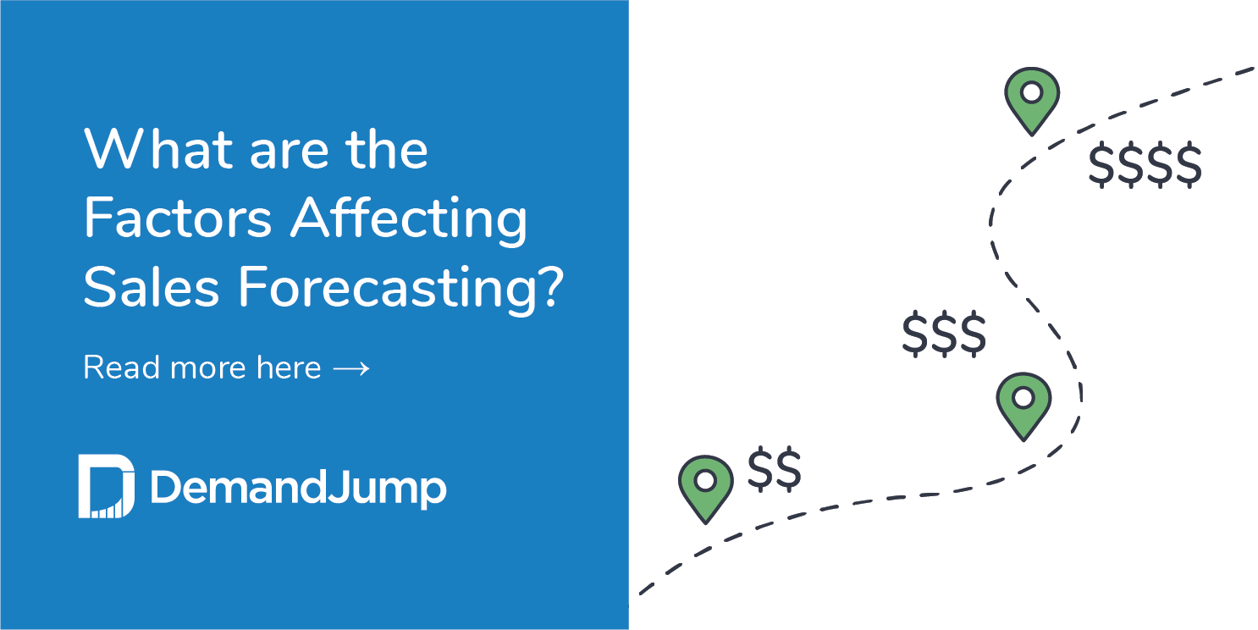What are the Factors Affecting Sales Forecasting?
September 15, 2020 •DJ Team

From one year to the next, sales will certainly vary. Sometimes it will be so slight you barely notice and other times it will be so dramatic that it alters your operations or production. With those sales fluctuations come revenue variances. Now, this may not seem like the best environment for forecasting sales, but it is possible, and the benefits of sales forecasting are far reaching, impacting every aspect of your company.
Sales forecasting isn’t just a shot in the dark, incorporating few, if any, hard facts and documented sales and growth activity. It is a science that you can’t afford to fail incorporating into your own organization.
Why is sales forecasting important?
Sales forecasting lets you plan future performance for your business. Not only can it help you plan for the future, I can also identify specific trends in sales while highlighting deficits and dips in company sales. If your company is young, or you are trying to start a company, sales forecasts become an integral part of your business plan - yet they are significantly tougher due to a lack of historical data. The more years a company has been around the more data to use in the model.
What are the advantages of forecasting?
Of course, sales forecasting helps you plan your inventory and adjust sales goals, but there are other areas that are just as important. It can help you attract investors and potential talent. You can create a more effective budget and aid in strategic planning.
Understanding the elements of sales forecasting
There are several methods of sales forecasting that can be applied to your business. Of course, there is not a one size fits all and what works for one company may not work for the next. However, understanding the mechanics as well as the limitations of forecasting will help you better utilize it for your organization.
From sales planning to production scheduling as well as any other revenue based activity, you need a system in place for tracking sales and forecasting future sales.
How do you predict a sales forecast?
Forecasting sales is a fairly straightforward mathematical process. If you have enough data at your disposal, you can do it. Simply multiply the unit quantity by the sales price you’ve set. Create projections for each month but factor in things like seasonal surges, lulls, and any other expected changes Piece of cake, right? Unfortunately, it is often not that simple as there are many other factors that impact actual sales, including external factors. Most important is that you have an accurate representation of what has been driving sales historically. A comprehensive marketing attribution model is step one.
What are the factors affecting sales forecasting?
It is important to remember that there are limitations of forecasting and that there are a seemingly endless number of factors that can impact the accuracy. Any influences that affect the company, community, or industry has the potential to affect forecasting.
Some of the most common factors affecting sales, and thus should be taken into account when creating the forecast include:
- Marketing spend
- Budget allocation
- Economic conditions
- Political conditions
- Customer satisfaction
- Even weather
All of these things must be taken into consideration in order to not only ensure an accurate forecast, but to understand the shortcomings of any forecast.
Forecasting techniques for increased accuracy
Sales forecasting is essentially useless if it isn’t accurate. It doesn’t take much effort to throw up a few numbers and call it good. However, when you get down to the nitty gritty, accurate forecasting requires good, solid data from reliable sources. You can’t just hastily put something together, it must be carefully cultivated, analyzed, and incorporated into your forecast. The accuracy of the data the forecast is built tends to be the most common reason for a poor forecast.
How can I make my sales forecast more accurate?
Some of the biggest factors that influence forecasts are time and data. Knowing how to forecast sales using historical data will definitely work to your advantage. Begin with listing all the factors that could impact your sales, both increasing them and decreasing them. Statistical methods of sales forecasting can also be very effective in increasing accuracy.
What variables can affect the accuracy of a forecasting model?
There are a number of factors that can affect forecasting accuracy. Seasonal fluctuations, regulations changes, and business growth are some of the most common, but accounting changes and even the emergence of new competitors in the marketplace (or the loss of old ones) can have a significant impact as they all work to narrow the focus of the data.
Sales forecasting is indeed a science and very necessary if you want to maintain the status quo of your operations or grow your business in any way. It is well worth investing your time and energy into pursuing.
One way to help your company forecast more accurately, and to better understand the way your customers search on the web, is to use DemandJump. Try it for free today!
Featured Articles
Categories
- Attribution Tracking (13)
- Channel Optimization (11)
- Consumer Insights (68)
- Content Marketing (251)
- Data Science (8)
- Digital Marketing (6)
- Digital Transformation (26)
- Enterprise (10)
- Lead Generation (14)
- Market Intelligence (8)
- Marketing Analytics (39)
- Marketing Attribution (57)
- Marketing Management (153)
- Marketing Operations (86)
- Organic Search (222)
- Paid Search (52)
- Pillar-Based Marketing (63)
- Programmatic Advertising (9)
- SaaS Content (14)
- SaaS Marketing (29)
- Search Marketing (111)
- SEO Keyword Research (28)
- SEO Pillar (18)
- SEO Strategy (46)
- SMB (5)
- Website Content (12)


